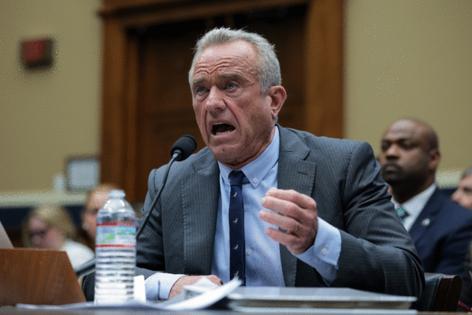How a Supreme Court win for public health bolstered RFK Jr. and threatens no-cost vaccines
Published in News & Features
WASHINGTON — Public health advocates won a big case in the Supreme Court on the last day of this year's term, but the victory came with an asterisk.
The decision ended one threat to the no-cost preventive services — from cancer and diabetes screenings to statin drugs and vaccines — used by more than 150 million Americans who have health insurance.
But it did so by empowering the nation's foremost vaccine skeptic: Health and Human Services Secretary Robert F. Kennedy Jr.
Losing would have been "a terrible result," said Washington attorney Andrew Pincus. Insurers would have been free to quit paying for the drugs, screenings and other services that were proven effective in saving lives and money.
But winning means that "the secretary has the power to set aside" the recommendations of medical experts and remove approved drugs, he said. "His actions will be subject to review in court," he added.
The new legal fight has already begun.
Last month, Kennedy cited a "crisis of public trust" when he removed all 17 members of a separate vaccine advisory committee. His replacements included some vaccine skeptics.
The vaccines that are recommended by this committee are included as preventive services that insurers must provide.
On Monday, the American Academy of Pediatrics and other medical groups sued Kennedy for having removed the COVID-19 vaccine as a recommended immunization for pregnant women and healthy children. The suit called this an "arbitrary" and "baseless" decision that violates the Administrative Procedure Act.
"We're taking legal action because we believe children deserve better," said Dr. Susan J. Kressly, the academy's president. "This wasn't just sidelining science. It's an attack on the very foundation of how we protect families and children's health."
On Wednesday, Kennedy postponed a scheduled meeting of the U.S. Preventive Services Task Force that was at the center of the court case.
"Obviously, many screenings that relate to chronic diseases could face changes," said Richard Hughes IV, a Washington lawyer and law professor. "A major area of concern is coverage of PrEP for HIV," a preventive drug that was challenged in the Texas lawsuit that came to the Supreme Court.
By one measure, the Supreme Court's 6-3 decision was a rare win for liberals. The justices overturned a ruling by Texas judges that would have struck down the popular benefit that came with Obamacare. The 2012 law required insurers to provide at no cost the preventive services that were approved as highly effective.
But conservative critics had spotted what they saw was a flaw in the Affordable Care Act. They noted the task force of unpaid medical experts who recommend the best and most cost-effective preventive care was described in the law as "independent."
That word was enough to drive the five-year legal battle.
Steven Hotze, a Texas employer, had sued in 2020 and said he objected on religious grounds to providing HIV prevention drugs, even if none of his employees were using those drugs.
The suit went before U.S. District Judge Reed O'Connor in Fort Worth, who in 2018 had struck down Obamacare as unconstitutional. In 2022, he ruled for the Texas employer and struck down the required preventive services on the grounds that members of the U.S. Preventive Services Task Force made legally binding decisions even though they had not been appointed by the president and confirmed by the Senate.
The 5th Circuit Court put his decision on hold but upheld his ruling that the work of the preventive services task force was unconstitutional because its members were "free from any supervision" by the president.
Last year, the Biden administration asked the Supreme Court to hear the case of Xavier Becerra vs. Braidwood Management. The appeal said the Texas ruling "jeopardizes health protections that have been in place for 14 years and millions of Americans currently enjoy."
The court agreed to hear the case, and by the time of the oral argument in April, the Trump administration had a new secretary of HHS. The case was now Robert F. Kennedy Jr. vs. Braidwood Management.
The court's six conservatives believe the Constitution gives the president full executive power to control the government and to put his officials in charge. But they split on what that meant in this case.
The Constitution says the president can appoint ambassadors, judges and "all other Officers of the United States" with Senate approval. In addition, "Congress may by law vest the appointment of such inferior officers" in the hands of the president or "the heads of departments."
Option two made more sense, said Justice Brett M. Kavanaugh. He spoke for the court, including Chief Justice John G. Roberts and Justice Amy Coney Barrett, and the court's three liberal justices.
"The Executive Branch under both President Trump and President Biden has argued that the Preventive Services Task Force members are inferior officers and therefore may be appointed by the Secretary of HHS. We agree," he wrote.
This "preserves the chain of political accountability. ... The Task Force members are removable at will by the Secretary of HHS, and their recommendations are reviewable by the Secretary before they take effect."
The ruling was a clear win for Kennedy and the Trump administration. It made clear the medical experts are not "independent" and can be readily replaced by RFK Jr.
It did not win over the three justices on the right. Justice Clarence Thomas wrote a 37-page dissent.
"Under our Constitution, appointment by the President with Senate confirmation is the rule. Appointment by a department head is an exception that Congress must consciously choose to adopt," he said, joined by Justices Samuel A. Alito and Neil M. Gorsuch.
©2025 Los Angeles Times. Visit at latimes.com. Distributed by Tribune Content Agency, LLC.







Comments